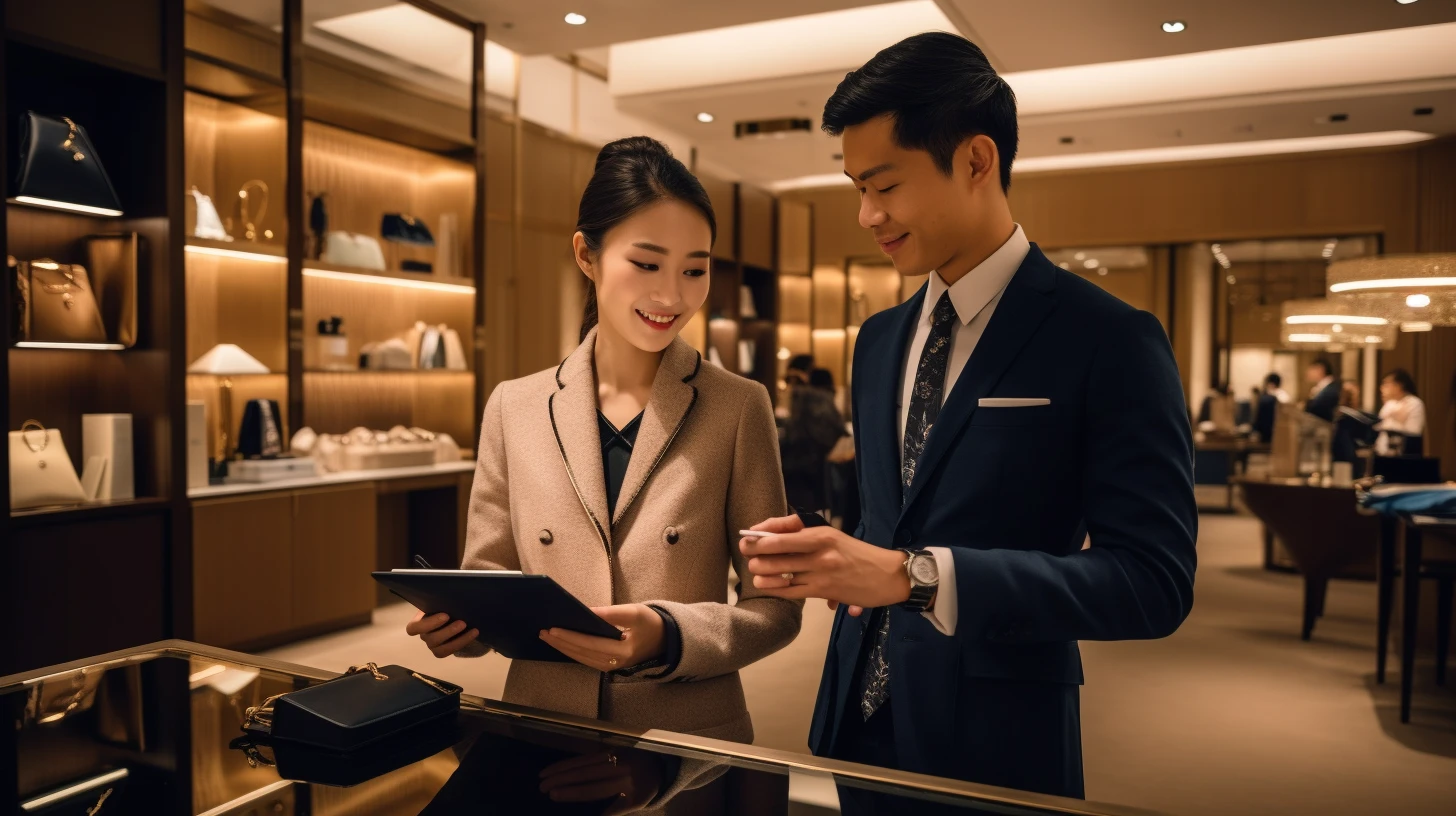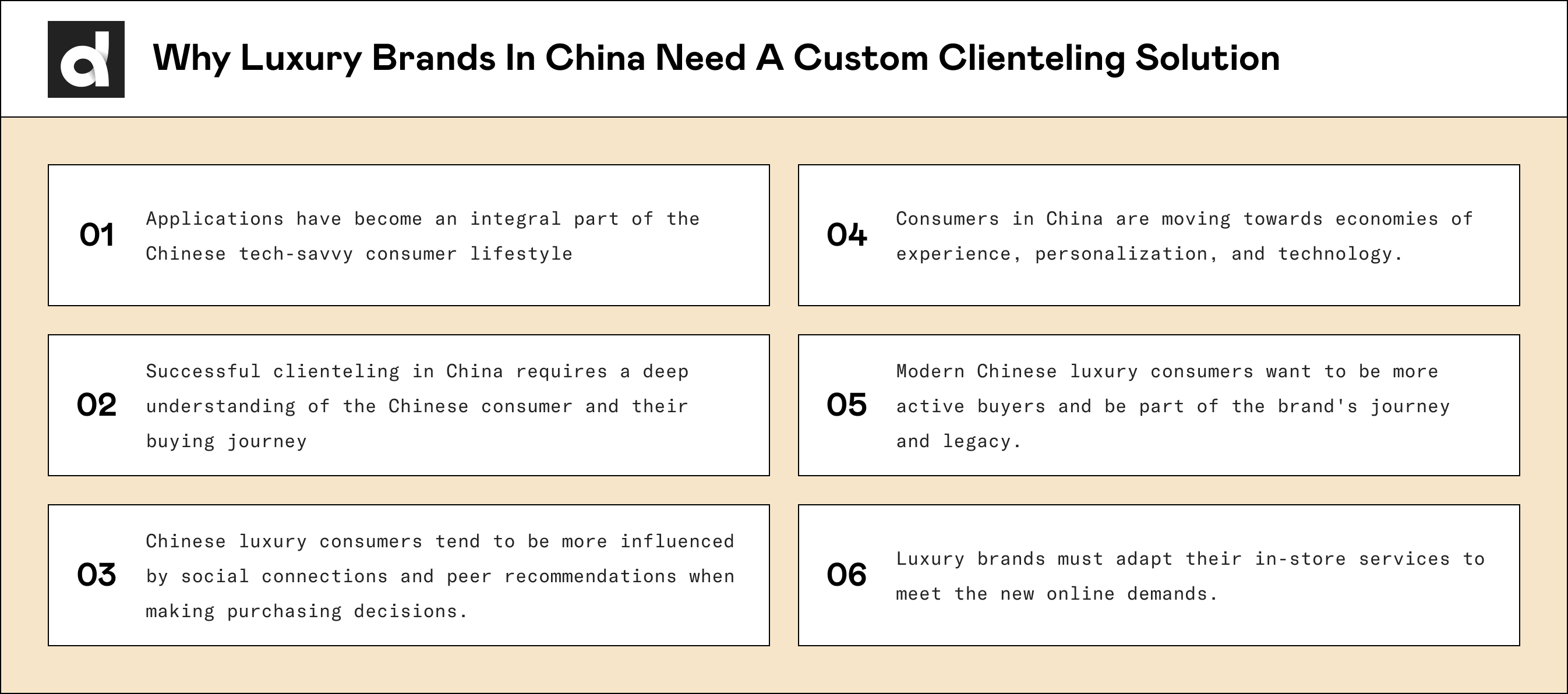Why Luxury Brands In China Need A Customized Clienteling App
April 12th, 2023 · Written by Samuel Jesse

Contents
Why Luxury Brands In China Need A Custom Clienteling Solution
China is a major hub of luxury consumption. Post-pandemic luxury market recovery is happening faster than ever as Chinese consumers continue to increase spend domestically.
According to Bain, sales in the Chinese mainland will make up a whopping 25-27% of the personal luxury goods market by 2030 - that's almost three times the pre-pandemic rate of 11%; globally, up to 40% of luxury goods sales will be made by Chinese consumers.
Of course, with luxury goods being the ultimate discretionary purchase, consumer confidence is crucial to see a rebound in purchasing to 2021 levels. Nevertheless, for a large demographic of Chinese luxury consumers, the feel-good factor plays a huge role in their willingness to splurge, whether it's in-store or online. So if you're a luxury brand looking to capture Chinese consumers' hearts (and wallets), it's worth paying attention to this particular group and figuring out how to tap into that feel-good factor.
With the expanding customer base and technological advancements, luxury brands face two significant challenges that require careful consideration.
- The growing dominance of e-commerce in luxury retail poses a threat to the exclusivity factor that has always been the hallmark of luxury.
- Providing a premium shopping experience, both in-store and online, and maintaining the high standards of service that luxury consumers demand poses another challenge for luxury retailers in China.
A custom clienteling app can be the ultimate solution that addresses the rise of e-commerce and the demand for premium customer service in China's luxury market. This innovative technology has proven an effective strategy for many luxury brands looking to increase their influence in a tech-savvy country like China.
What Is a Clienteling App?
Many brands use clienteling apps to track and leverage customer data to provide a personalized and seamless shopping experience. It is a digital equivalent of the “little black book” that combines customer data with product availability, inventory, promotions, and other information.
The app provides sales associates access to customer profiles, purchase histories, and preferences, enabling them to offer personalized recommendations and tailored services. In-store, sales associates can use the app to make notes of personal interactions, create a wishlist, offer personalized styling suggestions, and check product availability. On the other hand, for online purchases, the clienteling app can help customers to browse products and make purchases from anywhere, at any time, using their preferred device.
Clienteling apps have been around for several years, but their popularity has significantly grown recently, particularly in the luxury retail sector. The rise of e-commerce and changing consumer behavior have led luxury brands to seek innovative ways to connect with customers and provide in-store and online personalized service.
The Covid-19 pandemic has also accelerated the adoption of clienteling apps, as many retailers have had to rely more heavily on technology to connect with customers and provide personalized service. With the ability to communicate with customers remotely and offer virtual consultations, clienteling apps have become an essential tool for luxury retailers looking to thrive in an increasingly digital world.

Sales person holding clienteling app in luxury retail store
Why Luxury Brands In China Need A Custom Clienteling Solution
China is a crucial destination for high-end brands looking to expand their global footprint. However, the Chinese luxury consumer landscape is unique and clearly presents challenges that brands must navigate to remain competitive.
The Chinese luxury consumer differs from those in other countries with individual preferences and behaviors. To meet the demands of the tech-savvy Chinese consumer, conquer the challenges, and adapt to the unique features of the Chinese luxury retail market, luxury brands are turning to custom clienteling solutions.

1. Applications have become an integral part of the Chinese consumer lifestyle.
China is a particularly tech-savvy market, with a high adoption rate of mobile devices and social media platforms.
WeChat, first launched in 2011, has since become a universal super app central to most daily activities in China. It boasts an impressive 1.3 billion monthly users. It offers a wide range of features, including instant messaging, voice and video calls, social media feeds, mobile payments, and mini-programs that allow users to shop, play games, order food, book travel, and more. It has become an essential tool for communication and daily life in China. Many users rely on it for everything from chatting with friends and family to making purchases and managing their finances.
For luxury brands, WeChat has become a crucial platform for engaging with Chinese consumers and building customer relationships. By using WeChat as a platform for their clienteling apps and its broad range of features, including its payment system and mini-programs, luxury brands can reach a larger audience and offer personalized and convenient shopping experiences to their customers, driving sales and building brand loyalty.
2. Successful clienteling in China requires a deep understanding of the Chinese consumer and their buying journey.
While many luxury brands have significant data collection systems in place to track consumer preferences, there often needs to be more understanding when it comes to the emotional factors that influence purchasing decisions.
In China, cultivating strong relationships is crucial to building trust and loyalty, and many luxury brands employ dedicated sales associates to establish and nurture relationships with high-value customers. This can involve offering personalized recommendations, exclusive access to events or products, and VIP treatment. Personalized communication through WeChat or other social media platforms is common in China.
Using a customized clienteling app can facilitate social interactions and referrals between customers, as well as between sales associates and customers. This allows luxury brands to use omnichannel data integration to build stronger transactional and emotional bonds with clients and tap into the power of social networks to drive sales.
3. Chinese luxury consumers tend to be more influenced by social connections and peer recommendations when making purchasing decisions.
China is a collectivist society, and people place great importance on the opinions and preferences of their social circles. WeChat, with its mini-programs and channels, provides a platform for users to share and discuss their interests and purchases with their peers.
For luxury brands in China, this means that clienteling apps can be used to leverage the power of social influence to drive sales. By using transactional data to provide personalized recommendations based on what their peers are purchasing, brands can tap into their customers' social networks to influence their buying decisions. By incorporating community features into the app, brands can further reinforce the feeling of being part of a group of like-minded consumers.
4. Consumers in China are moving towards economies of experience, personalization, and technology.
Shopping is not just a means of economic negotiation. Today's consumers seek a unique and memorable experience enriched by customization and technology.
As technology advances, the landscape of consumer preferences constantly evolves, with new trends such as the metaverse, NFTs, AR, and VR emerging in the market. Brands must keep up with these changes and adapt quickly, requiring access to accurate product performance data. A customized clienteling app makes it easier for brands to stay on top of shifting consumer needs and desires, identifying which products are popular and what adaptations may be necessary. This allows luxury brands to provide their customers with the latest and most sought-after products and experiences, ensuring they stay ahead of the curve in a competitive marketplace.
By creating tailor-made clienteling apps, brands can offer immersive experiences, such as augmented reality (AR) filters personalized to each customer's tastes and preferences. These innovative features can even be connected to the rapidly growing web3 world of the metaverse, taking luxury shopping to a new level.
5. Modern Chinese luxury consumers want to be more active buyers and be part of the brand's journey and legacy.
Luxury brands can fulfill this desire by allowing consumers to play multiple roles, including seller and shareholder.
An afluendor (ambassador+influencer+vendor) is a term used to describe existing luxury customers who have significant influence within their social circle and can act as vendors for a brand. They are often seen as key advocates for luxury brands. They can help spread positive word-of-mouth about products and services to their network and potentially drive sales by promoting and selling products to their friends and family.
With a customized clienteling app, luxury brands can leverage the power of afluendors by creating programs that allow them to become official sellers of their products, using social media and other digital channels to promote and sell the brand's offerings to their followers.
Additionally, the app can create a sense of community where consumers feel heard and valued, even having a say in certain brand decisions. Ultimately, the clienteling app allows consumers to engage with the brand on their terms and in a way that feels meaningful to them.
6. Luxury brands must adapt their in-store services to meet the new online demands.
A clienteling app can help bridge the gap between what luxury brands want to offer and what consumers experience, providing a seamless shopping journey that blends both the online and offline worlds.
Access to consumers' profiles on the app allows in-store associates to understand their preferences better, providing personalized service and recommendations when they visit in person. Brands can also use notifications to promote new products and special offers in-store, making outreach more efficient and effective.
Additionally, a custom mobile clienteling app can help sales associates maintain their responsibilities while outside the store. It allows them to access all client data and transactions and to follow up on reminders and tasks remotely.
In today’s China, offering high-quality products is not enough to attract and retain customers. Consumers are seeking meaningful experiences and personalization in their shopping journeys. That's why a customized clienteling app is essential for luxury brands looking to stand out and succeed. By offering tailored experiences and personalization, brands can better connect with their customers and foster loyalty. As the personalization economy continues to flourish, now is the time for luxury brands to invest in a clienteling app to stay ahead of the game.
Build Your Custom Clienteling App With Us:
Are you looking to make a strong entrance into the Chinese luxury market? If so, building a clienteling app for your brand is one of the most effective ways to gain a foothold. And Digital Creative Asia is the perfect partner to help you achieve your goals.
Our experienced designers and developers are dedicated to creating exceptional digital experiences for our clients. With over a decade of expertise in tech and a track record of successful projects for luxury retail brands, we have the skills and creativity needed to build an app that perfectly fits your brand and target audience.
Take advantage of this opportunity to enhance your brand's presence in the Chinese market. Contact us at Digital Creative Asia today and let us help you take your brand to the next level with a customized clienteling app.
Have a project in mind?
Join our newsletter!
Get valuable insights on the latest digital trends, strategies, and developments in China and globally delivered straight to your inbox.
